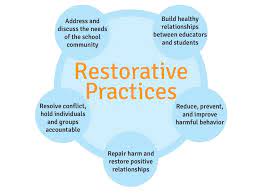- Ferguson-Florissant School District
- Restorative Practices
Multi-Tiered Systems of Support (MTSS)
Page Navigation
What are "Restorative Practices"?
-
Restorative Practices, or RP, is a framework rooted in relationship building and rebuilding, designed to create a culture of equity and belonging that rethinks how we view conflict and results in healing and learning. The Ferguson-Florissant School District embraces Restorative Practices ensuring that all, including those who have been harmed, will have their needs and experiences recognized and acted upon, thus creating a supportive climate of empowerment for all. In some cases, students may be separated from their assigned school building, but never completely separated from their education.

-
Why We Are Committed to Restorative Practices
Restorative Practices have been shown to have a positive effect on school climate, culture, and academics (including improved student attendance, test scores, and graduation rates), and on outcomes related to discipline policies and practices including reductions in discipline referrals, violent and serious incidents, and punitive and exclusionary discipline responses.*
While these are powerful reasons enough to shift to a restorative approach to education, teachers and students will point to more personal reasons for why it is important. Students report a greater sense of belonging, voice, and empathy while teachers report greater experience of connection with students and satisfaction in their jobs. To learn more about why RP is important, read Understanding the “Why?” of Circles by Annie O’Shaughnessy, M.Ed.
*Adapted from Jon Kidde’s Restorative Justice: A Yardstick for Schools and Restorative Justice in Schools: Outcomes and Indicators

Restorative Practices Resources
-
Resources for Building Classroom Community
Staff Support
For help implemententing RP into your classroom, a specific activity, or school, contact:
Dr. Bonita Jamison, Executive Director of Integrated
Email: bjamison@fergflor.org
(314) 824-2060,Guides
Introducing and Developing Community Building Circles in MS and HS Advisory or Classrooms by Annie O’Shaughnessy. This short document provides a step by step guide and 6 circle scripts for getting started.
The Circle Keeper’s Handbook by Kay Pranis. From a leader in the country on the circle process comes this powerful guide. A great compliment to Annie’s Circle Process Guide.
Tools
Restorative Justice lesson plan from Teaching Tolerance
Circle Process Graphics and Handouts from Living Justice Press
Resources from Oakland Unified School District
Inspiration
Talking Circles: For Restorative Justice and Beyond: A TT awardee discusses how Talking Circles empower her middle school students
Baby Steps towards Restorative Justice, a veteran teacher writes about her journey with restorative practices.
Reflections on the Inner Journey, Kay Pranis writes about the inner work required of us when we commit to being restorative.
Discipline With Dignity: Oakland Classrooms Try Healing Instead of Punishment by Fania Davis
For responses to harm and conflict:
Discipline That Restores, from Fresno Pacific University—a great resource with tools and perspectives.
Other resources:
The International Institute for Restorative Practices (IIRP) Graduate School is the world’s first graduate school wholly devoted to restorative practices. Visit their website here.
Other districts:
Chicago Public Schools Restorative Toolkit. A beautifully designed and comprehensive guide.
Restorative Justice Partnership: Denver and Beyond. This is a new and exciting resource with free webinars on a wide range of topics.
-
Resources for Parents
Parents may wonder what it means for our schools to be taking a restorative approach. First and foremost it means that the District has made the commitment to institute practices, policies, and procedures that ensure the safety, dignity, and right to learn of each and every student. It also means that the District has committed to prioritizing the building of relationship and community so that when challenges arise, each member feels the support needed to rise to the challenge and restore what has been harmed.
This means that as implementation continues, parents, students, and staff will see more and more ways in which harm is repaired collaboratively with the focus being on meeting the needs of the person who was harmed. Parents of students who have been harmed or have caused harm are encouraged to ask to become actively involved in the process of repairing the harm.
Here are some resources that can help you learn more about Restorative Practices. We will be adding to this list of resources soon!
- A Quick Overview of Restorative Approach in schools by the Scott Foundation
- “Understanding the Why” by Annie O’Shaughnessy can help you better understand what RP is beyond a different way to respond to harm.
- Restorative Justice On the Rise, visit their home page and scroll down for a wide variety of podcasts on restorative justice in schools and community.
If you feel you or your student has been harmed, please contact:
Dr. Bonita Jamison, Executive Director of Integrated Supports and Accelerated Learning
Phone: (314) 824-2066
Email: bjamison@fergflor.org

